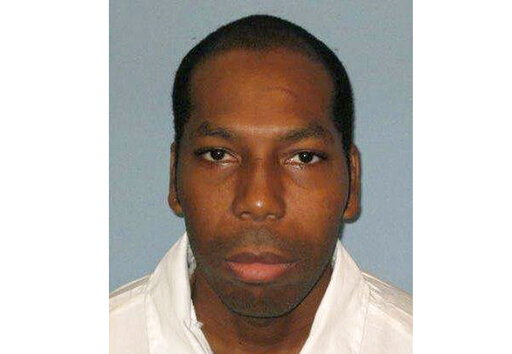MONTGOMERY, Ala. (AP) — A Muslim inmate who complained that the state of Alabama won’t let him have an Islamic spiritual adviser beside him when he’s executed awaited a U.S. Supreme Court decision on whether the lethal injection would be carried out as planned Thursday evening or put on hold.
Attorneys for Dominique Ray, 42, say Alabama’s execution procedure favors Christian inmates because a Christian chaplain employed by the prison typically remains in the execution chamber during a lethal injection.
Ray, as a Muslim, had asked that his imam replace the chaplain in the death chamber, but the request was denied. The state said it refuses to let a non-prison employee into the room where the lethal injection is given — though it has agreed to skip its usual practice of having the chaplain present.
On Wednesday, the 11th U.S. Circuit Court of Appeals agreed to halt Thursday’s execution plan so Ray’s arguments could be weighed.
“The central constitutional problem here is that the state has regularly placed a Christian cleric in the execution room to minister to the needs of Christian inmates, but has refused to provide the same benefit to a devout Muslim and all other non-Christians,” the court’s three-judge panel wrote.
The Alabama attorney general’s office urged the U.S. Supreme Court to reverse the decision.
The filings played out under a ticking legal clock. The execution had been scheduled for 6 p.m. Central, and the state has until midnight to carry it out before the death warrant expires. Otherwise the state must go to court seek a new execution date for Ray, who was convicted of the rape and murder of a 15-year-old girl decades ago.
Attorneys for the state say that Ray had ample opportunity to visit with his imam before his scheduled execution, that only prison employees are allowed in the chamber for security reasons, and that the imam can visit him before he’s led to the execution chamber and witness the execution from an adjoining room.
Responding to another 11th-hour defense request, the state also said Ray had access to a Quran, and he was allowed to take a prayer mat into a holding cell.
Other states generally allow spiritual advisers to accompany condemned inmates up to the execution chamber but not into it, said Robert Dunham, executive director of the Death Penalty Information Center, which studies capital punishment in the United States.
Durham said did not know of any other state where the execution protocol calls for a Christian chaplain to be present in the execution chamber.
Ray was sentenced to death for the slaying of 15-year-old Tiffany Harville. The girl disappeared from her Selma home in July 1995, and her decomposing body was found in a cotton field a month later.
Ray was convicted in 1999 after another man, Marcus Owden, confessed to his role in the crime and implicated Ray. Owden told police that they had picked the girl up for a night out on the town and then raped her. Owden said that Ray cut the girl’s throat. Owden pleaded guilty to murder, testified against Ray and is serving a life sentence without parole.
A jury recommended the death penalty for Ray by an 11-1 vote.
Ray’s attorneys had also asked in legal filings to stay the execution on other grounds. Lawyers say it was not disclosed to the defense team that records from a state psychiatric facility suggested Owden suffered from schizophrenia and delusions.





